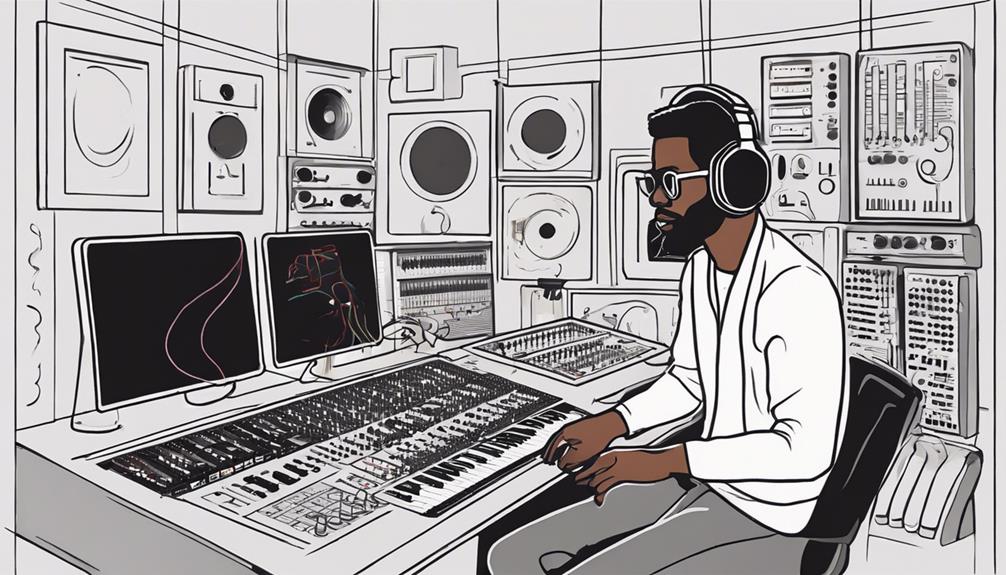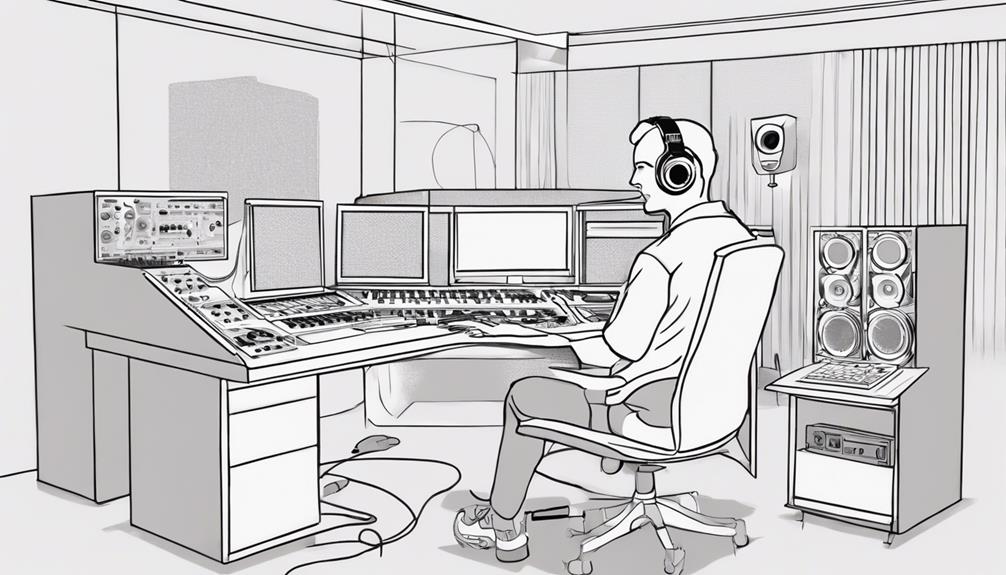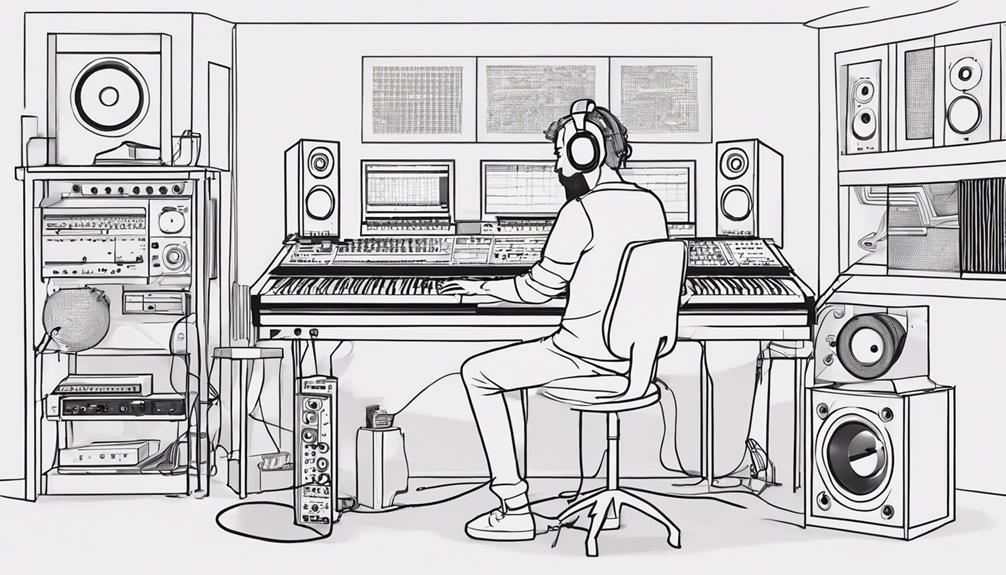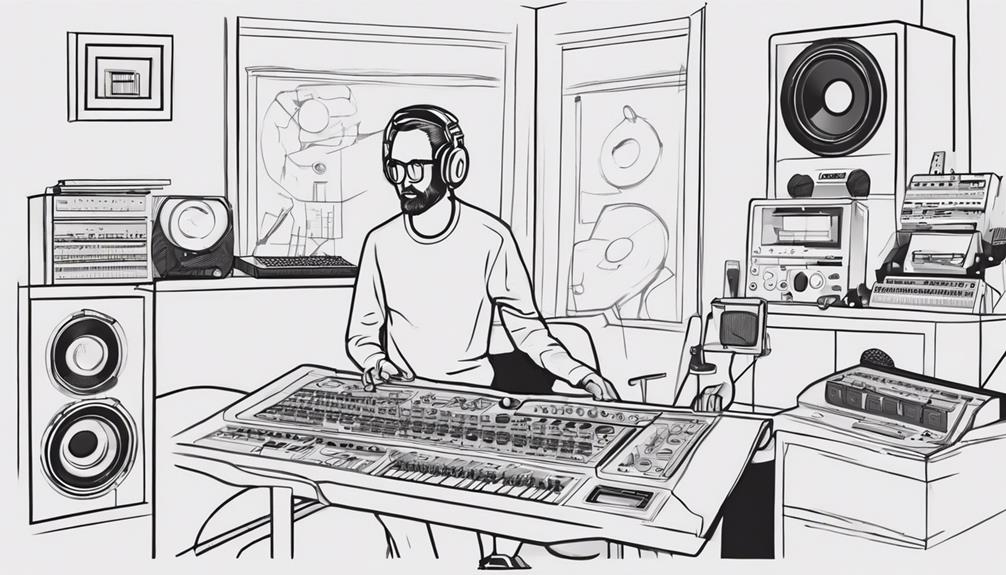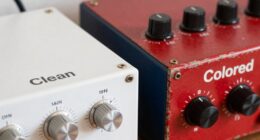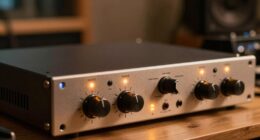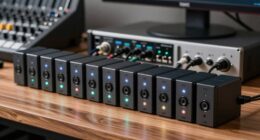Improve your music production skills by mastering your DAW tools, optimizing workflow efficiency, and experimenting with effects. Prioritize completing tracks over seeking perfection, embrace creativity by exploring diverse genres and fostering a musical mindset. Focus on simplicity and quality, remembering that less can be more impactful. Aim for continuous improvement through practice and seeking feedback. Trust your instincts, learn music theory, and build an efficient workflow. Balance variation and repetition strategically for dynamic music. For more in-depth tips and tricks, keep exploring the expert advice provided to enhance your music production journey.
Key Takeaways
- Experiment with different genres and styles for fresh inspiration.
- Prioritize workflow efficiency with structured plans and deadlines.
- Seek feedback to refine skills and embrace continuous improvement.
- Embrace simplicity and quality over complexity.
- Trust instincts, take risks, and stay authentic in creative decisions.
Mastering Technical Skills
To improve as a music producer, focus on mastering the technical skills essential for creating high-quality tracks. Production involves understanding your digital audio workstation (DAW) tools thoroughly to optimize workflow efficiency. Familiarize yourself with features such as automation, track routing, and plugin integration to streamline your creative process and work more efficiently.
Enhancing your mixing skills is vital for achieving a professional sound. Learn techniques like sub-mixing and collective processing to balance frequencies, create depth, and polish your tracks. Experiment with different effects and tools to understand how they affect the overall sound of your music.
Sound design plays a significant role in making your tracks stand out. Explore techniques such as re-amplification and white noise manipulation to add texture and excitement to your productions. By incorporating unique sound elements, you can create a signature style that sets your music apart.
Additionally, incorporating composition strategies like utilizing silence as a musical element can help you evoke emotions and create dynamic tension in your tracks.
Mastering these technical skills will elevate the quality of your music productions and help you grow as a music producer.
Prioritize Workflow Efficiency
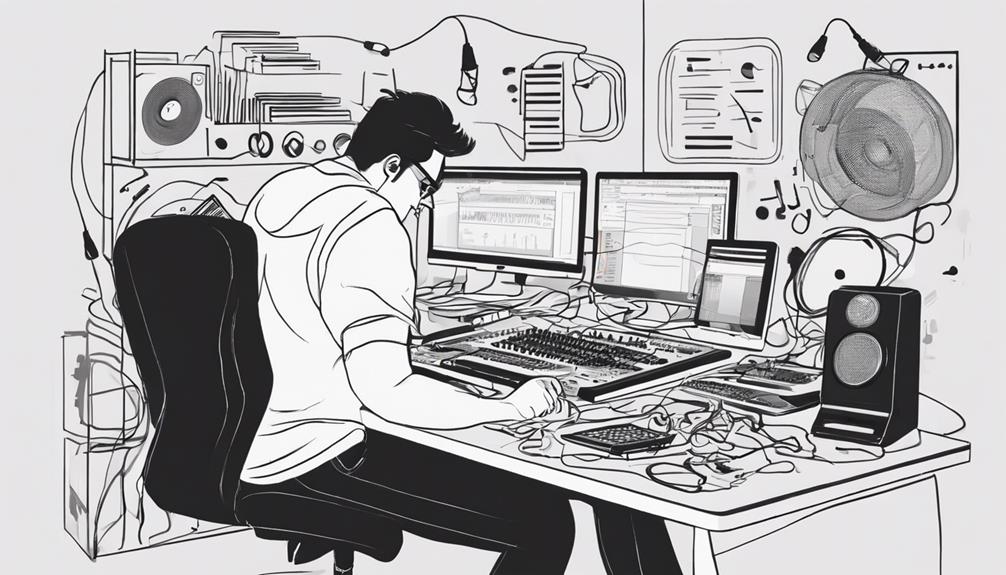
Prioritize workflow efficiency by implementing strategies to optimize your music production process effectively.
To enhance your music production workflow, take regular breaks every 15-20 minutes to prevent ear fatigue and maintain focus.
Focus on completing tracks rather than aiming for perfection to boost efficiency and productivity.
Create a structured plan and set deadlines for each production session to stay organized and maximize your output.
Utilize feedback lists for your work-in-progress projects to track improvements and guarantee you complete essential tasks.
Remember to maintain flexibility by keeping your projects open to changes and adjustments for a streamlined workflow.
By following these steps, you can improve your efficiency, stay on track with your music production goals, and produce high-quality finished tracks more consistently.
Prioritizing workflow efficiency is key to becoming a more effective music producer.
Embrace Creativity and Exploration
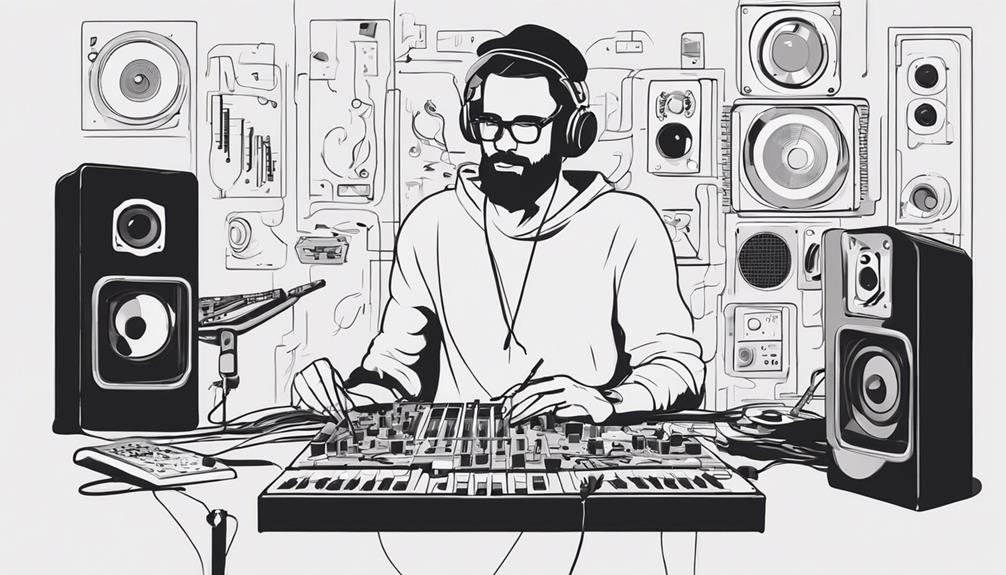
To become a better music producer, embrace creativity and exploration in your work.
Cultivate an artistic mindset that encourages musical experimentation by blending diverse elements in your compositions.
Keep pushing boundaries by incorporating stolen elements from different styles to create unique and authentic music.
Cultivate Artistic Mindset
Embrace creativity and exploration in your music production to cultivate an artistic mindset that thrives on innovation and authenticity. Learning to blend diverse elements and experiment with different genres can spark new ideas and push the boundaries of your sound.
By staying true to your artistic identity and avoiding conforming to industry standards, you can create music that resonates authentically with your audience.
Here are four tips to help you cultivate an artistic mindset in your music production:
- Blend Diverse Elements: Experiment with combining different sounds, instruments, and techniques to create a unique sonic experience.
- Explore Various Genres: Step out of your comfort zone and explore new musical styles to inspire fresh ideas and foster innovation in your production.
- Embrace Authenticity: Connect with your audience by staying true to yourself and infusing your music with genuine emotions and experiences.
- Stay Innovative: Draw inspiration from a variety of sources and don't be afraid to borrow ideas or incorporate elements from different genres to keep your music fresh and exciting.
Foster Musical Experimentation
Cultivating an artistic mindset through embracing creativity and exploration in your music production sets the foundation for fostering musical experimentation. Experimenting with different genres and styles can spark fresh creativity, leading to innovative approaches in music production.
By incorporating stolen elements and diverse influences into your music, you can generate unique ideas that set your tracks apart.
To truly innovate in music production, it's essential to push boundaries and explore new sound design techniques. Breaking traditional rules can open up a world of possibilities and help you expand your sound palette. Techniques like using white noise and re-amplification can add energy and depth to your tracks, creating a more dynamic listening experience.
Embracing simplicity and authenticity is key to creating music that reflects your true artistic identity. By staying true to yourself and experimenting with diverse influences, you can engage in meaningful musical experimentation that drives your creativity to new heights.
Strive for Simplicity and Quality
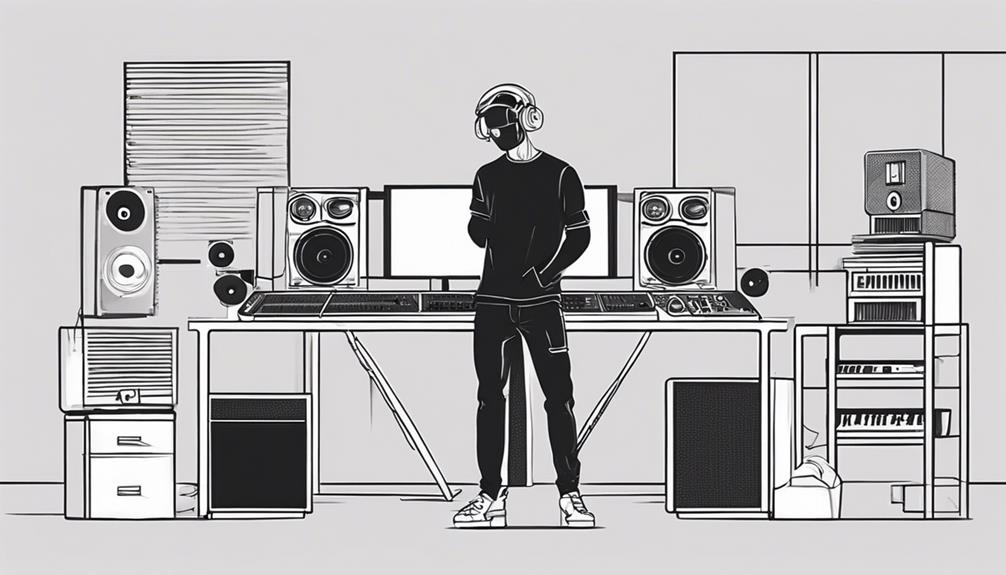
When aiming for simplicity and quality in your music production, keep in mind that simple beats can have a big impact.
Prioritize quality over quantity by focusing on clear sounds and meticulous editing.
Simple Beats, Big Impact
Aim to create simple beats with impactful elements to make a lasting impression on your audience. When focusing on quality over complexity, your music production will maintain a professional sound that resonates with listeners.
To achieve this, consider the following tips:
- Prioritize Quality: Concentrate on the quality of your beats rather than the quantity of elements in your composition. A few well-crafted sounds can have a more significant impact than a cluttered mix.
- Keep it Clean: Aim for a clean and uncluttered mix by carefully selecting elements that complement each other. This approach enhances the overall impact of your beats and improves the clarity of your composition.
- Embrace Minimalism: Utilize minimalistic arrangements and sounds to create a strong, memorable groove in your music. Simple beats with effective composition can leave a lasting impression on your audience.
- Memorable Grooves: Focus on creating beats that aren't only simple but also catchy and memorable. A strong groove can captivate listeners and make your music more impactful.
Quality Over Quantity
Prioritizing simplicity and quality in your music production is essential for creating impactful and memorable tracks. By focusing on quality over quantity, you can achieve a refined sound that resonates with your audience. Paying attention to detail and aiming for a high standard will set your productions apart from the rest. Embrace the concept that less can be more in music production – simplicity allows each element to shine and contribute to the overall quality of the track.
To emphasize the importance of quality over quantity, consider the following comparison table:
| Quality Over Quantity Comparison | Quality | Quantity |
|---|---|---|
| Attention to Detail | ✔ | ✘ |
| Simplicity | ✔ | ✘ |
| High Standard | ✔ | ✘ |
| Refined Sound | ✔ | ✘ |
| Rushed Work | ✘ | ✔ |
Clear Sound, Better Production
To enhance your music production skills, focus on achieving a clear sound through simplicity and quality in your work. When aiming for a better production, remember these key points:
- Simplify Your Production Process: Avoid overcomplicating arrangements and effects to maintain a clear sound. Keeping things simple can often lead to a more impactful and cohesive final product.
- Prioritize Quality Over Quantity: Focus on meticulous editing and sound selection rather than trying to include too many elements in your tracks. Quality always trumps quantity in the world of music production.
- Trust Your Instincts and Intuition: When making creative decisions, rely on your gut feeling to guide you towards a simplified and high-quality outcome. Your intuition can be a powerful tool in the production process.
- Use Time-Saving Measures Effectively: Streamline your workflow by utilizing tools and techniques that help you work more efficiently. By saving time on menial tasks, you can dedicate more energy to ensuring the overall quality of your music production.
Aim for a balanced mix of simplicity and quality to create a clear and impactful sound that resonates with listeners.
Continuous Improvement Is Key
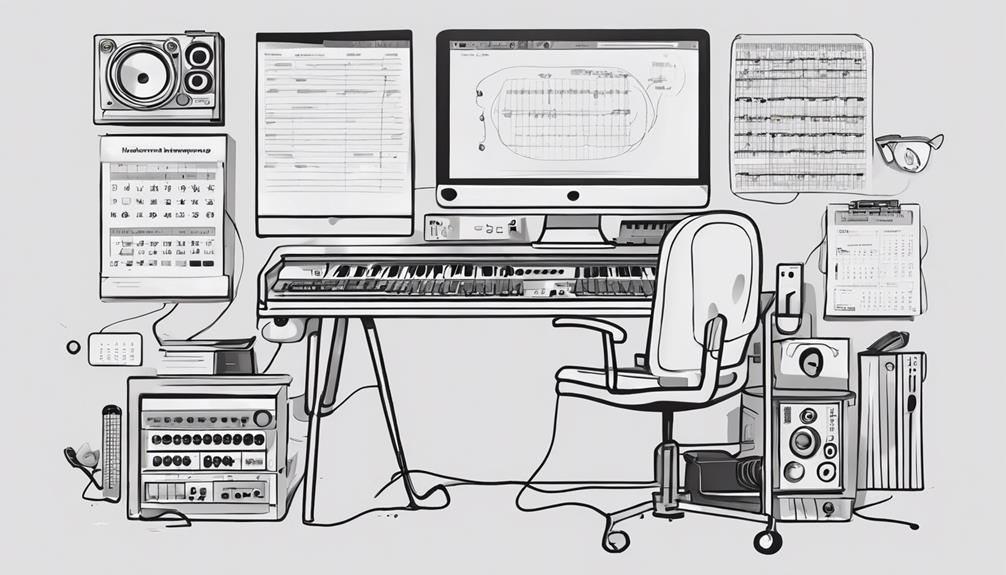
Consistent practice and a commitment to lifelong learning are fundamental for achieving continuous improvement in music production. As music producers, embracing the journey of skill development and focusing on cultivating a unique style through experimentation are key elements in your growth. It's essential to prioritize continuous improvement by regularly seeking feedback and constructive criticism to refine your production skills. Stay updated on new techniques, tools, and trends within the industry to enhance your abilities and keep your sound fresh and innovative.
| Continuous Improvement Tips | Description |
|---|---|
| Embrace Skill Development | Focus on honing your craft rather than comparing yourself. |
| Seek Feedback | Actively look for constructive criticism to refine your skills. |
| Stay Updated | Keep abreast of new techniques and trends to enhance your production. |
Follow Your Instinct
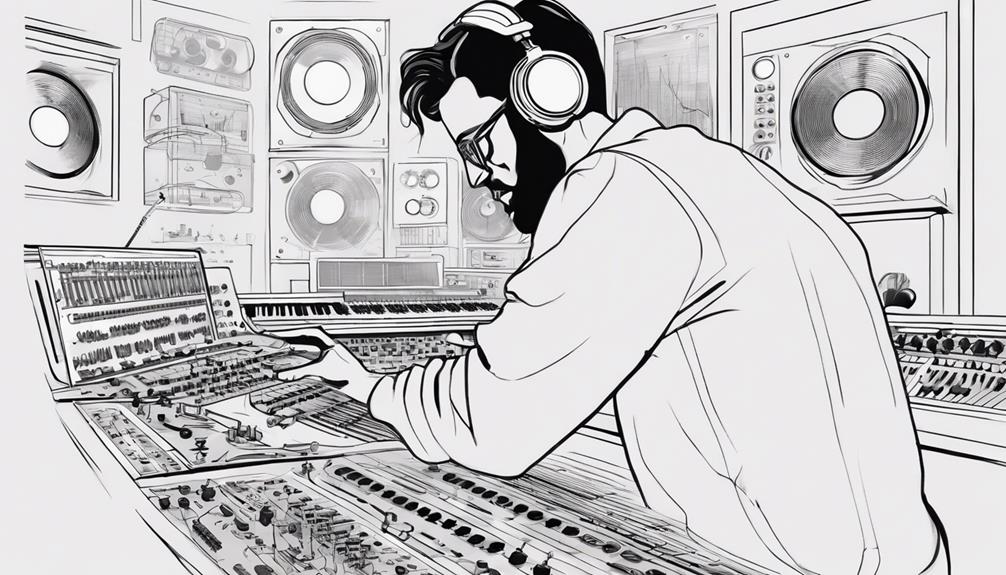
Trust your instincts is essential when making creative decisions in music production. Your instincts are like a compass guiding you towards unique and innovative production choices.
Here are some tips to help you follow your instincts effectively:
- Listen to Your Inner Voice: Pay attention to that gut feeling or sudden inspiration that nudges you towards a particular sound or arrangement. Your instincts often lead you to creative paths you mightn't have considered otherwise.
- Experiment Freely: Don't be afraid to take risks and try out new ideas that your instincts are urging you to explore. Being open to experimentation can lead to breakthrough moments in your music production.
- Trust Your Unique Perspective: Your instincts are shaped by your individual experiences and tastes. Embrace your distinct viewpoint, as it can help you craft a signature sound that sets you apart from others.
- Stay Authentic: Following your instincts can help you create music that feels authentic and true to yourself. Trusting your creative decisions based on intuition can lead to a more personalized and genuine musical expression.
Learn Music Theory
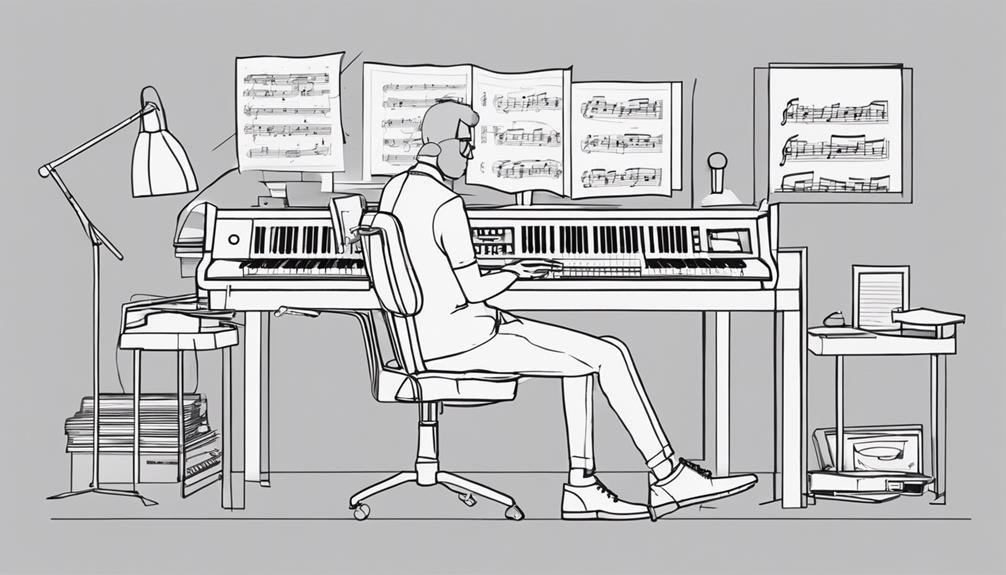
Understanding music theory is essential for enhancing your skills as a music producer and creating more engaging compositions. When you study music theory, you explore the foundational elements of music, such as scales and intervals. This knowledge not only helps you craft harmonious melodies but also allows you to construct enthralling chord progressions that form the backbone of your tracks.
By grasping the intricacies of music theory, you gain a deeper understanding of how to convey emotions through your musical ideas and structure your songs effectively.
Moreover, familiarity with music theory enables you to communicate your musical concepts with clarity and collaborate seamlessly with other musicians. It provides you with a common language to express your creative vision and experiment with different genres and styles in your music production journey.
Embrace the power of music theory to enhance your productions and open up a world of endless possibilities in your musical endeavors.
Build an Efficient Workflow
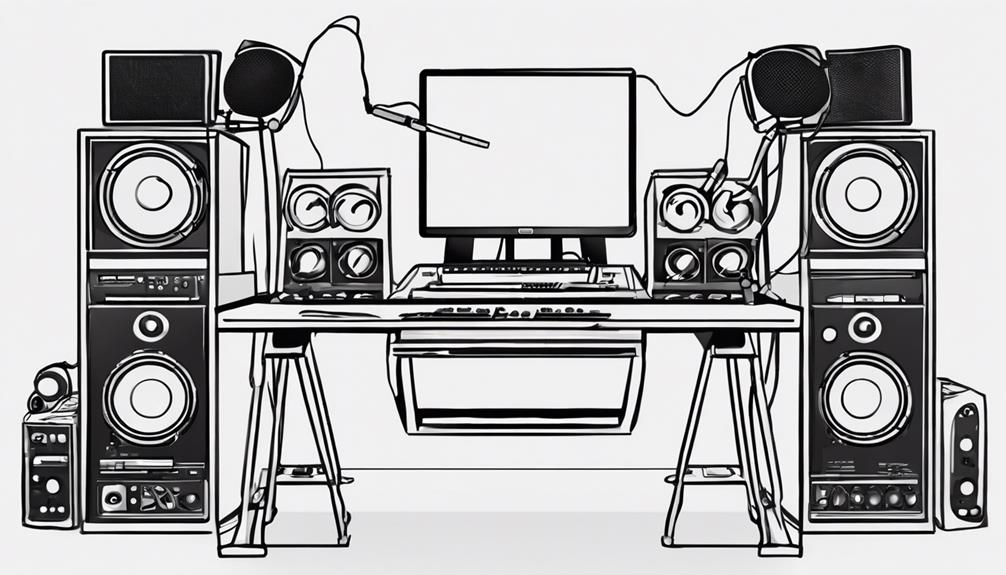
To improve your music production workflow, focus on creating custom DAW templates with pre-set effects and instruments for efficiency.
Organize your workspace and files to access tools and resources quickly during your sessions.
Utilizing MIDI controllers can also enhance control and speed up your production process.
Streamline Production Process
Efficiently building a streamlined production process is essential for music producers looking to optimize their workflow and productivity. To enhance your music production efficiency, consider the following tips:
- Organize Your Samples:
Keep your samples, presets, and project files neatly organized to save time searching for specific assets during your creative process.
- Create Custom Templates:
Develop custom templates in your DAW with your favorite plugins and settings. This will help you start new projects more efficiently and maintain consistency in your sound.
- Utilize Keyboard Shortcuts:
Take advantage of keyboard shortcuts and macros in your DAW to speed up tasks like editing, arranging, and mixing. This can significantly increase your workflow speed.
- Establish a Structured Routine:
Set up a structured routine for your music production sessions to stay focused and boost productivity. Having a consistent workflow can help you make the most out of your creative time.
Organize Project Files
Organizing your project files is essential for building an efficient workflow as a music producer. By implementing a consistent naming convention for tracks, stems, and versions, you can easily navigate and collaborate with others.
Grouping similar elements into folders or tracks helps streamline the production process, reducing clutter and saving time searching for specific components. Additionally, utilizing color-coding for tracks or sections enhances visual organization, making it easier to identify different parts of your project at a glance.
Remember to regularly back up your project files to prevent data loss and maintain continuity in your music production efforts. By incorporating these practices into your workflow, you can optimize your productivity and focus more on the creative aspects of music production.
Stay organized, stay efficient, and watch your music production skills soar to new heights.
Learn Sound Design
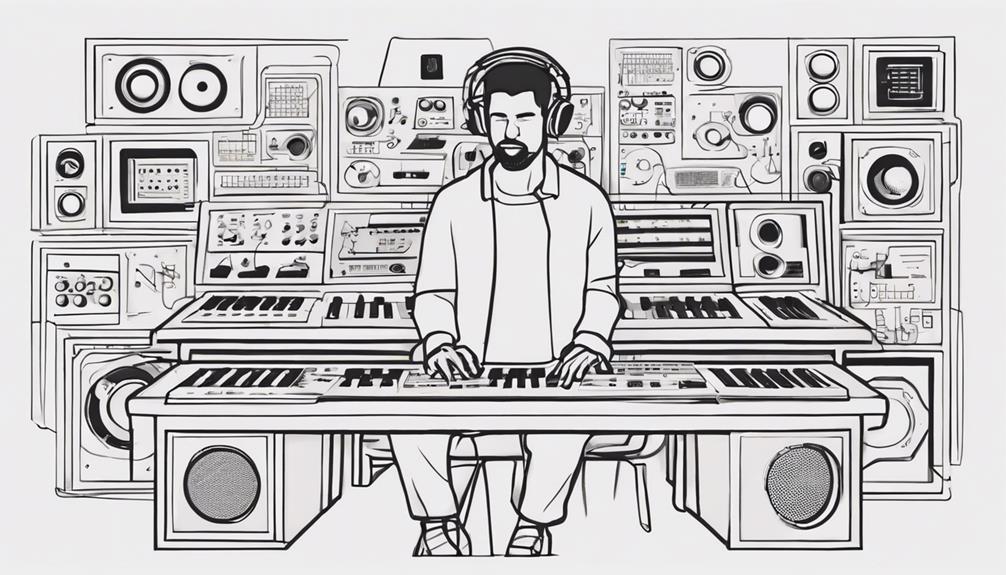
Enhancing your music production skills involves immersing yourself in the world of sound design, where audio elements are crafted and manipulated to create unique textures and timbres.
To excel in sound design, consider the following tips:
- Explore Synthesis Methods: Understanding techniques like subtractive, additive, FM, and wavetable synthesis can broaden your sound design palette and help you create diverse sonic textures.
- Experiment with Parameters: Engage in manipulating parameters such as oscillators, filters, envelopes, and LFOs to sculpt sounds that are rich in depth and character, allowing for greater creativity in your music production.
- Utilize Effects: Incorporating effects like reverb, delay, distortion, and modulation can add depth and dimension to your sounds, transforming them into unique and captivating elements within your tracks.
- Develop Your Sonic Identity: Learning sound design principles will enable you to develop a signature sound that sets you apart from others in the music industry, establishing your unique sonic identity and making your productions stand out.
Balance Variation and Repetition
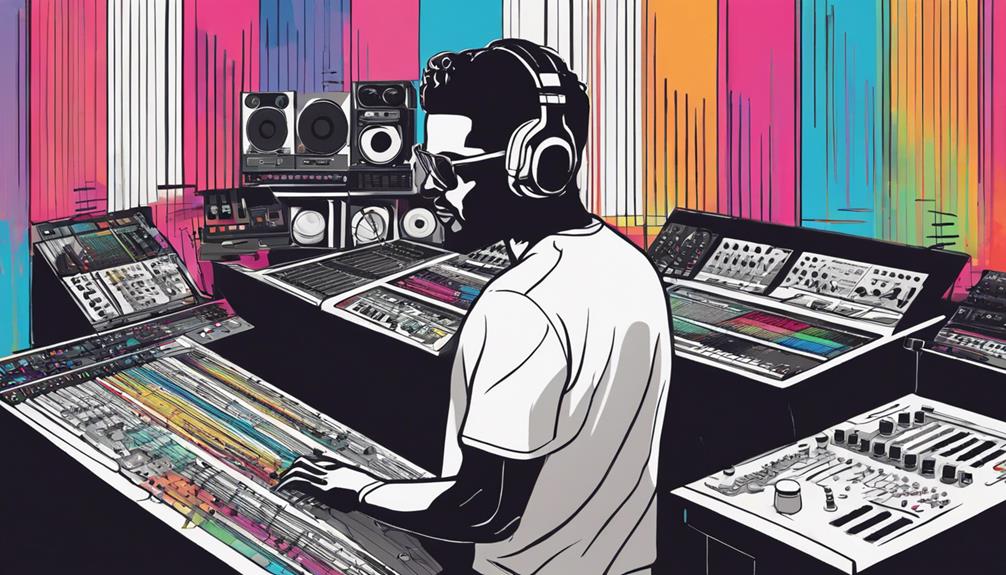
How can you effectively balance variation and repetition in your music production to create dynamic compositions?
In music production, finding the right mix of variation and repetition is essential for engaging your audience while maintaining cohesion in your tracks.
Variation adds interest by introducing new elements like melodies, rhythms, or textures. It keeps listeners engaged and prevents your music from becoming monotonous.
On the other hand, repetition helps reinforce key elements and establish familiarity within the song. Strategic use of repetition can create a sense of continuity and emphasize important parts of your composition.
Experiment with different ways to incorporate variation while using repetition to anchor your music. By striking a balance between these elements, you can craft dynamic and engaging music that captivates your audience from start to finish.
Frequently Asked Questions
How to Become a Very Good Music Producer?
To become a very good music producer, immerse yourself in music theory, practice diligently, seek feedback, explore various genres, and stay updated on industry trends. Your dedication and passion will catapult you to greatness.
How to Keep Improving as a Music Producer?
To keep improving as a music producer, you must stay dedicated to practicing consistently, learning from others, experimenting with new techniques, seeking feedback, and setting challenging goals. These efforts will help you grow and evolve. Additionally, exploring different genres and studying their unique characteristics can expand your creative horizons and inspire fresh ideas. Don’t hesitate to watch tutorials, read articles, or listen to podcasts that share valuable tips for improving music production, as staying informed can be a game-changer. Remember, persistence and an open mind are key to unlocking your full potential as a producer.
How Do You Get Good at Music Production?
Start by dedicating time to consistent practice. Experiment with various genres and tools to broaden your skills. Seek inspiration from others and focus on completing songs. Collaborate to gain new perspectives. Your journey in music production awaits.
What Do Music Producers Struggle With?
Struggling with creative blocks, technical challenges like mixing, and balancing creativity with skills are common for music producers. Managing time, seeking feedback, and overcoming self-doubt can be challenging but essential for growth in music production.
Conclusion
So, keep honing those skills, perfecting your craft, and never stop exploring new sounds.
Remember, like a conductor guiding a symphony, you have the power to create magic with each beat and melody.
Stay curious, stay inspired, and keep pushing the boundaries of what's possible in the world of music production.
The journey may be long, but the destination is worth every note.
Keep on creating and let your music soar!

